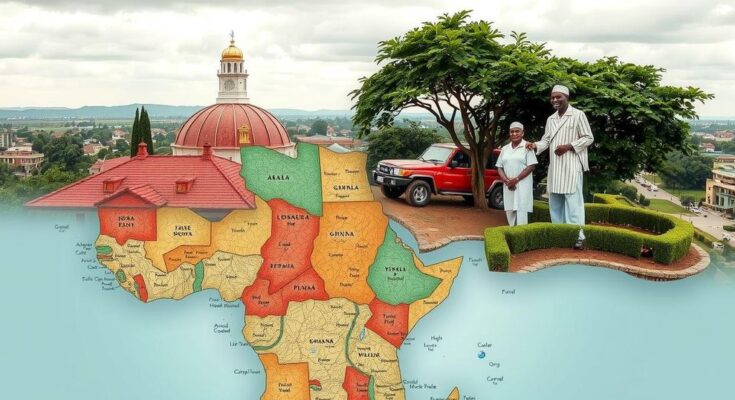Ghana elected former president John Mahama of the NDC back to power, marking a significant political shift after the NPP’s poor electoral showing. This election mirrors global trends of anti-incumbency, seen with recent wins for opposition parties in several African nations. Public discontent over economic issues and corruption significantly influenced voter decisions, leading to a decisive victory for Mahama.
Ghana demonstrated a significant political shift in its December 7 elections by electing John Mahama, a former president and the candidate of the opposition party, National Democratic Congress (NDC), back to power. This victory marks a notable comeback for Mahama, who had previously faced defeats by incumbent President Nana Akufo-Addo. Following eight years under Akufo-Addo, the ruling New Patriotic Party (NPP) will now adapt to its new role as the main opposition party after a historic electoral loss.
The outcome of the elections in Ghana parallels trends observed globally, with Mahama’s return likened to recent events involving U.S. President-elect Donald Trump, who also regained power following prior defeat. The results reflect a broader anti-incumbent sentiment prevalent in several African nations, where opposition parties have gained ground in Senegal, Mauritius, and Botswana, while established parties in Namibia and South Africa contend with diminished majorities.
Ghana’s electorate expressed their dissatisfaction with the NPP due to factors such as soaring inflation, environmental destruction linked to illegal gold mining—termed Galamsey—and various corruption scandals that fostered disillusionment among the populace. Although Ghana has historically witnessed closely contested elections, the lack of enthusiasm among NPP supporters in this instance led to a decisive win for Mahama’s NDC, prompting an early concession from Bawumia, the NPP’s candidate.
The political landscape in Ghana is characterized by a competitive multi-party system, with regular transitions of power between the NDC and NPP. This election follows a trend observed in various countries across Africa and globally, where citizens have increasingly opted to replace ruling incumbents as they voice their frustrations over economic challenges and governance issues. The 2023 elections underscored these sentiments, as public discontent manifested in the polls, resulting in opposition victories in multiple regions.
In conclusion, Ghana’s recent elections signify a shift in political dynamics, highlighting the voters’ rejection of the incumbent administration amid economic hardships and governance failures. John Mahama’s resurgence as president reflects a global trend of growing anti-incumbent sentiment, particularly in Africa, where citizens demand accountability and responsiveness from their leaders. As the NPP navigates its new role in opposition, the evolving political landscape in Ghana will likely continue to attract attention both regionally and internationally.
Original Source: www.worldpoliticsreview.com




